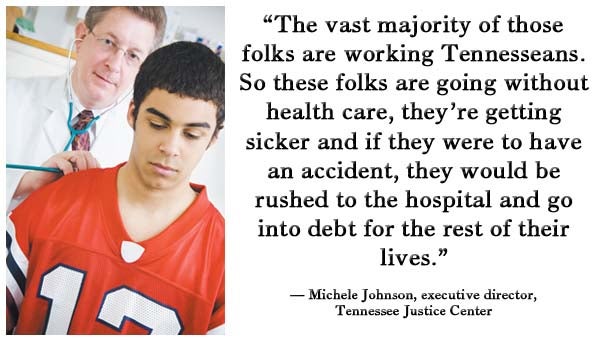More than 200,000 Tennesseeans in coverage gap remain uninsured
Published 8:39 am Friday, March 18, 2016

Tennesseans who do not qualify for TennCare and cannot afford health insurance coverage in the federal healthcare marketplace will remain uninsured following a House subcommittee decision Wednesday.
Members of the Insurance and Banking Subcommittee voted down a referendum on Governor Bill Haslam’s Insure Tennessee plan for this November. This amendment to TennCare (H.B. 2545/S.B 2422) would provide federally-funded health insurance to low-income Tennesseans between the ages of 19 and 64.
TennCare, Tennessee’s version of Medicaid, primarily covers the disabled, pregnant women, children, and caretaker relatives of young children, according to the Tennessee Division of Healthcare and Finance Administration (TDHCFA). Someone who earns less than the Federal Poverty Level wouldn’t necessarily qualify for TennCare.
The Affordable Care Act sought to cover individuals up to 400 percent of the poverty level, and expected states to expand Medicaid programs to cover people below 138 percent of the poverty level. Tennessee was one of 25 states that did not expand Medicaid. Without the expansion, many of those people cannot afford marketplace insurance and do not qualify for TennCare, creating what experts call a “coverage gap.”
Insure Tennessee was designed to cover those in the gap, whose individual incomes top out at about $16,000 annually, or $8 hourly, according to TDHCFA.
Based on data from the American Community Survey, conducted by the U.S. Census Bureau, the top occupations of the most employed adults who could benefit from Insure Tennessee are in food service, construction, cleaning and maintenance, sales, transportation, office and administrative support, production, personal care and installation and repair. These account for approximately 195,000 employed, uninsured Tennesseans. Approximately 280,000 people are promised access to one of two coverage plans under Insure Tennessee.
“The vast majority of those folks are working Tennesseans,” said Michele Johnson, executive director of the Tennessee Justice Center (TJC). “So these folks are going without health care, they’re getting sicker and if they were to have an accident, they would be rushed to the hospital and go into debt for the rest of their lives.”
The state failing to expand Medicaid also impacted hospitals. Planned cuts to hospital funding that were part of the Affordable Care Act still took place. These were designed to compensate for the fact that Tennesseans would be able to seek preventative care and that unpaid debts incurred by uninsured citizens to hospitals for non-emergencies would decrease.
Haslam negotiated a deal with the federal Centers for Medicare and Medicaid Services that would enable the state to use funds normally allocated for Medicaid expansion to fund Insure Tennessee. The amendment would not implement a new tax or cost the state money.
After two years, the federal funding would gradually decrease to cover 90 percent of the cost by 2020, which percentage would continue indefinitely. The Tennessee Hospital Association would pay the remaining 10 percent and has already pledged $74 million.
Opponents fear that it would incur costs or that the federal government will not follow through on its agreement, but the amendment states that any modifications to the funding arrangement would nullify Insure Tennessee, making it effectively cost-neutral.
According to TJC, Insure Tennessee would not only provide coverage for hundreds of thousands of uninsured Tennesseans, but it would create jobs, keep hospitals open, lower the rates of uncompensated care and boost the economy, without affecting the state budget.
According to the UT Center for Business and Economic Research, Tennessee would stand to gain 15,000 jobs under Insure Tennessee, which is estimated to have a spillover effect into local economies. The study also predicts over $1 billion of new purchasing power would flow through the state economy.
A study conducted by the Robert Wood Johnson Foundation found 257,000 Tennesseans are expected to be uninsured in 2016 because they do not qualify for coverage. It also estimated that in the same year, Tennessee will pass the buck on $2.3 billion in Medicaid funding and that hospitals would pass up $70 million in reimbursements because it has no mechanism to receive federal money earmarked for Medicaid expansion.
Over a 10-year period, the study found the cost of expanding Medicaid would be $1.7 million, with an income from federal dollars of $22.5 billion and reimbursements for hospitals totaling $7.7 billion.
The study also revealed that states that expanded Medicaid are receiving $13.41 for every dollar they invest.
If Insure Tennessee or a similar amendment is not enacted, billions of Tennesseans’ tax dollars will continue to fund similar programs in other states, nearly 300,000 Tennesseans will remain uninsured and debts to hospitals are predicted to continue to increase.




